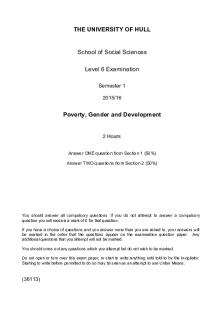Exam 2016, questions PDF

| Title | Exam 2016, questions |
|---|---|
| Course | Napoleon To Stalin: The Struggle For Mastery In Europe |
| Institution | University of East Anglia |
| Pages | 2 |
| File Size | 92.4 KB |
| File Type | |
| Total Downloads | 51 |
| Total Views | 133 |
Summary
Download Exam 2016, questions PDF
Description
UNIVERSITY OF EAST ANGLIA School of History Main Series UG Examination 2015-16
NAPOLEON TO STALIN: THE STRUGGLE FOR MASTERY IN EUROPE HIS-5017B Time allowed: 2 hours
Answer TWO questions.
Do not use the same material in the same way in more than one answer in this paper.
Notes are not permitted in this examination. Do not turn over until you are told to do so by the Invigilator.
HIS-5017B Copyright of the University of East Anglia
Module Contact: Dr Thomas Otte, HIS Version 1
Page 2
1. ‘Historians have generally exaggerated the stability and viability of the 1815 Vienna settlement.’ Discuss. 2. ‘The actions of the Great Powers between 1827 and 1853 were driven principally by their concerns about the Eastern Question.’ Discuss. 3. ‘A gambler and a ditherer, Napoleon III frittered away France’s quasidominance in Europe.’ Discuss this assessment of French foreign policy between 1851 and 1870. 4. ‘The reluctance of the other Powers to intervene in the affairs of Central Europe was the main reason for the unification of Germany between 1864 and 1870.’ Discuss. 5. Why were Great Power politics so stable in the period between 1871 and 1890? 6. ‘Unbounded ambition coupled with poor statesmanship propelled Germany down the road to war.’ Discuss with specific reference to the years, c. 1900-1914. 7. ‘The post-war peace settlements established between 1919 and 1925 were too weak to have any chance of success.’ Discuss. 8. ‘The policies pursued by Britain and France in appeasing the revisionist Powers made war inevitable in 1939.’ Discuss. 9. ‘To understand the emergence of the Cold War one should discount all notions of deeply laid plans by either Moscow or Washington.’ Discuss this view with reference to the period, c. 1944-1953. 10. ‘The so-called “Second Cold War” was the necessary response to the many failures of détente, and it brought the cold war itself to an end.’ Discuss this assessment with reference to the period, c. 1973 to 1989/91.
END OF PAPER
HIS-5017B
Version 1...
Similar Free PDFs

Exam 2015 - 2016, questions
- 6 Pages

Exam January 2016, questions
- 4 Pages

Exam 2016, questions
- 18 Pages

Exam 2016, questions
- 6 Pages

Exam 2016, questions
- 29 Pages

Exam 2013-2016, questions
- 24 Pages

Exam 2016, questions
- 2 Pages

Exam June 2016, questions
- 7 Pages

Exam 2016, questions
- 6 Pages

Exam 2016, questions
- 2 Pages

Exam 2016, questions
- 9 Pages

Exam 2 2016, questions
- 6 Pages

Exam May 2016, questions
- 6 Pages

Exam October 2016, questions
- 26 Pages

Exam 2016, questions
- 2 Pages

Exam 2016, questions
- 3 Pages
Popular Institutions
- Tinajero National High School - Annex
- Politeknik Caltex Riau
- Yokohama City University
- SGT University
- University of Al-Qadisiyah
- Divine Word College of Vigan
- Techniek College Rotterdam
- Universidade de Santiago
- Universiti Teknologi MARA Cawangan Johor Kampus Pasir Gudang
- Poltekkes Kemenkes Yogyakarta
- Baguio City National High School
- Colegio san marcos
- preparatoria uno
- Centro de Bachillerato Tecnológico Industrial y de Servicios No. 107
- Dalian Maritime University
- Quang Trung Secondary School
- Colegio Tecnológico en Informática
- Corporación Regional de Educación Superior
- Grupo CEDVA
- Dar Al Uloom University
- Centro de Estudios Preuniversitarios de la Universidad Nacional de Ingeniería
- 上智大学
- Aakash International School, Nuna Majara
- San Felipe Neri Catholic School
- Kang Chiao International School - New Taipei City
- Misamis Occidental National High School
- Institución Educativa Escuela Normal Juan Ladrilleros
- Kolehiyo ng Pantukan
- Batanes State College
- Instituto Continental
- Sekolah Menengah Kejuruan Kesehatan Kaltara (Tarakan)
- Colegio de La Inmaculada Concepcion - Cebu